No Pride In Prejudice: How Singapore’s LGBTQ+ Community Are Still Fighting For Equal Rights
CHIN NGIOK SHUAN attends Pink Dot to find out from the LGBTQ+ community how social stigmas and prejudices affect them and how they are still fighting for equality for themselves.
The Pink Dot event drew large crowds this year and everyone was warmly welcomed by other members of the community as well as volunteers who helped run the show. Photo by Chin Ngiok Shuan.
BY
Chin Ngiok Shuan
Sub-Editor
Hype Issue #55
Published on
June 30, 2022

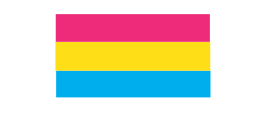
From unequal housing opportunities to laws opposing homosexual couples adopting children, the local Lesbian, Gay, Bisexual, Transgender and Queer (LGBTQ+) community tends to end up with the short end of the stick when it comes to living in Singapore.
Since June is Pride Month, the topic of equality of the LGBTQ+ community in Singapore is once again a hot topic for debate. With other Asian countries such as Taiwan legalising same-sex marriage back in 2019 and Thailand drafting laws that allow homosexual couples rights to adopt children, manage joint assets and liabilities amongst other additional rights, the local LGBTQ+ community is waiting for Singapore to follow in the footsteps of these countries.
Unfortunately, there is still a long way to go for Singapore. While there seems to be a growing support for the queer (defined as ‘relating to, or being a person whose sexual orientation is not heterosexual and/or whose gender identity is not cisgender’, and used in this article as an umbrella term for LGBTQ+) community, there are still many barriers that prevent them from being on equal standing with heterosexual couples in Singapore.
The repeal of section 377A of the Penal Code of Singapore is one example of a barrier. The issue has been widely contested in Singapore, especially within the last couple of years, as the number of supporters for the LGBTQ+ community increase. However, the government has refused to repeal the law even though it is typically unenforced, citing ‘its assessment that society has yet to adequately integrate the opposing views of mainstream conservatives and the homosexual community’, alongside other reasons such as the majority of Singaporeans regarding homosexual behaviour as inappropriate.
The government’s refusal to repeal 377A is not the only deterrent the LGBTQ+ community faces in Singapore. From a lack of community support to the local media restricting homosexual content for those under the age of 16, the seeming absence of support for the queer community is somewhat shocking.
The question remains: When will the LGBTQ+ community be free from the prejudices and stigmas that they face?
With the help of public movements such as Pink Dot, the answer is hopefully, ‘sooner than we expect’.
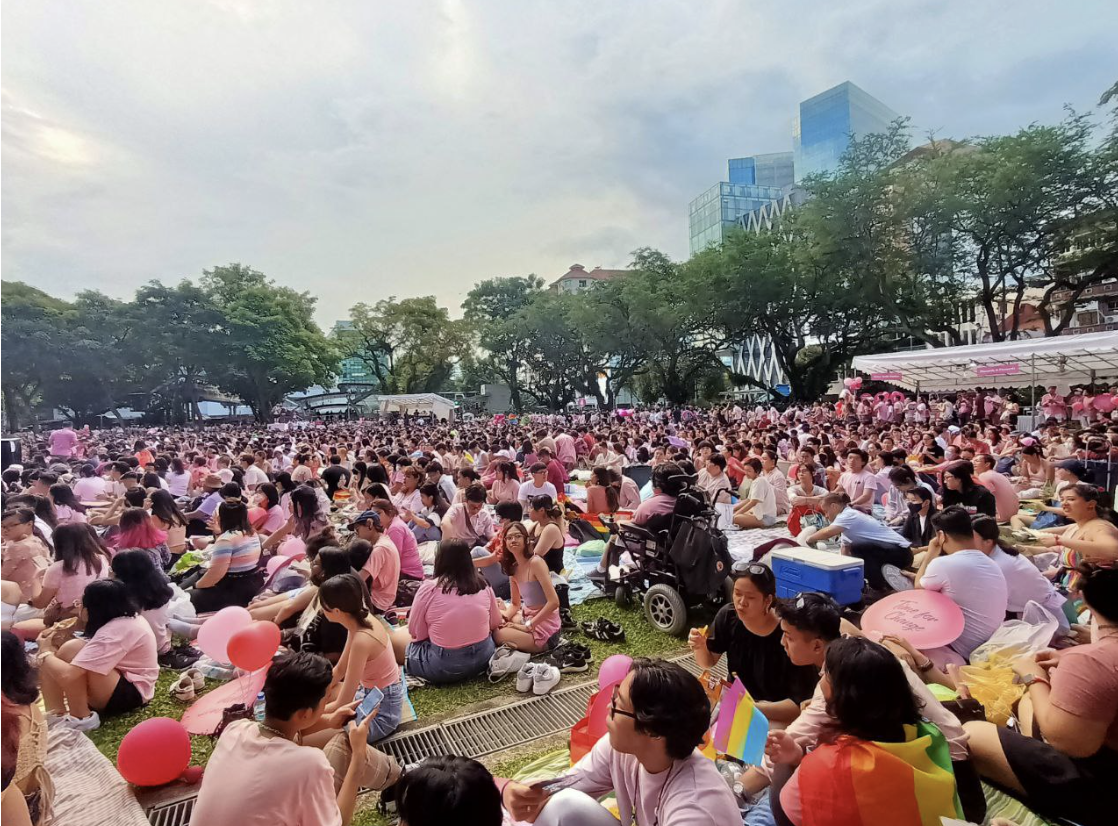
Thousands of attendees braved the sun to show up at this year’s Pink Dot after two years of non-physical events, celebrating each other’s pride. Photo by Chin Ngiok Shuan.
Pink Dot is Singapore’s biggest annual LGBTQ+ Pride movement. Since 2009, members of the local LGBTQ+ community have gathered at Hong Lim Park, where Pink Dot is usually held, to fight for their rights in Singapore. The non-profit group supports the belief that everyone, regardless of identity, gender and sexuality, deserves the freedom to love who they love and they hope to bring queer Singaporeans closer to their loved ones.
“Pink Dot has been my safe space. Every year, I meet so many people just like me who have been shunned by their families and friends just because we don’t identify as straight or cisgender, and we seek comfort in each other, because we can’t get that comfort anywhere else,” says Taylor Hung, 19, who identifies as gay. Cisgender is defined in the dictionary as ‘relating to, or being a person whose gender identity corresponds with the sex the person had or was identified as having at birth.’
“Every year, I meet so many people just like me who have been shunned by their families and friends just because we don’t identify as straight or cisgender, and we seek comfort in each other, because we can’t get that comfort anywhere else,”
Throughout my conversation with Taylor at Pink Dot, he mentioned the different struggles he has had to overcome. These include his estranged ties with his family due to his sexuality and their inability to accept him for who he loves. Additionally, his friends alienated him from their friendship group, and he also noticed that the people around him would mock him for being ‘different’.
Acceptance by their loved ones for who they are is a major struggle the LGBTQ+ community in Singapore faces.
“It’s not that we don’t care about being accepted, it’s just that we have never gotten the acceptance. To fully embrace ourselves, we have to deal with the fact that we’ll never be able to be the person our families and friends wanted us to be, and that we might lose them,” says Taylor.
“But I always believe that if they cannot accept me for who I am and who I love, there will always be others who will. Blood family isn’t always the family you need and sometimes, found family will be the ones who stand by you no matter what.”
“But I always believe that if they cannot accept me for who I am and who I love, there will always be others who will. Blood family isn’t always the family you need and sometimes, found family will be the ones who stand by you no matter what.”
Other than found family, acceptance may come from unexpected sources of strength – allies of the queer community.
These people may be friends or family members of those in the LGBTQ+ community. They may also be individuals who support the movement and offer a consolation to these queer members: They are never alone in their fight for equality.
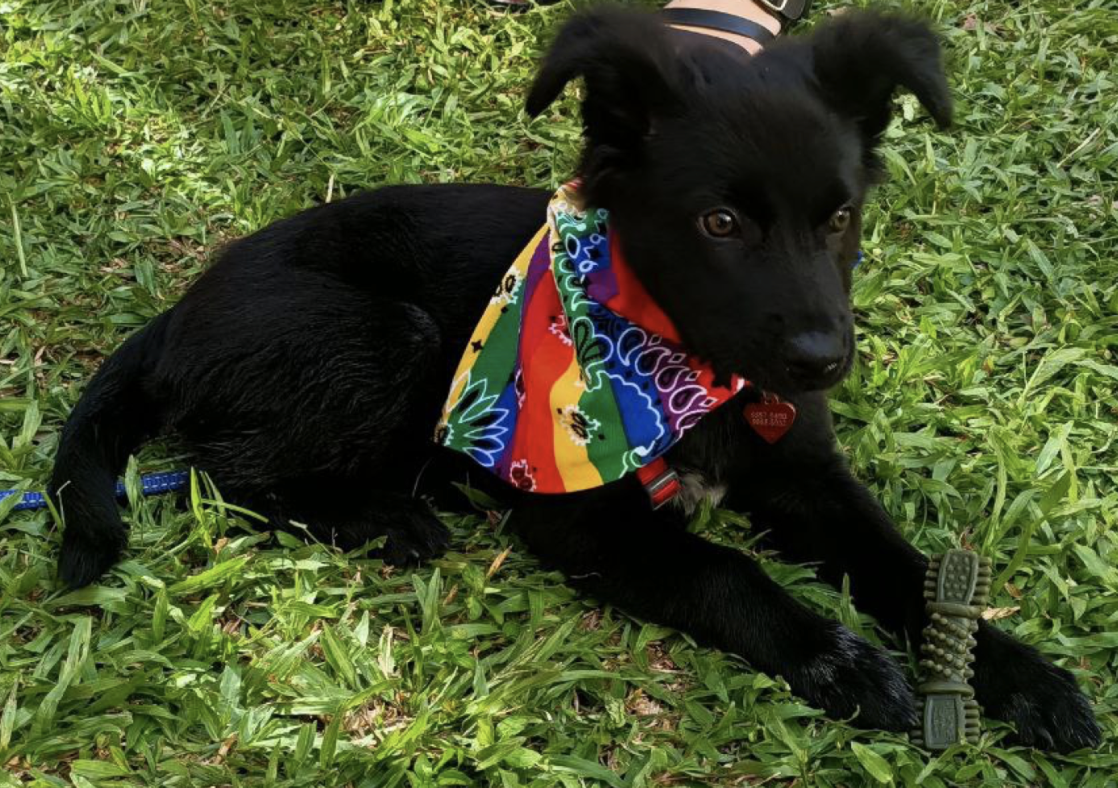
Allies may come in different shapes and sizes and Ponzu, brought by her owner Mr Roman (unpictured), was one of the allies present at Pink Dot. Photo by Chin Ngiok Shuan.
Negative stereotypes and stigmas are also common issues the LGBTQ+ community face.
Ms Leah Chia Yi Yang, 29, a transgender woman, says that the stereotypes that she has noticed about being transgender in Singapore are that “most of us are promiscuous, do sex [work] or that we are unnatural” due to their transition from their birth gender to the one they now identify as. “These stigmas affect us in our education and employment,” she adds, indicating that some employers do not want to associate themselves with people from the LGBTQ+ community as they do not support them.
“The one [stigma] I hate the most is when people find out about my sexuality and they come up to me and tell me ‘[you] should go back to church’, or ‘you’re so beautiful, you’re just wasting your potential’,” says Marie “Changu” Chang, 25, about being pansexual and gender-fluid.
Pansexuality is one of the many sexualities under the LGBTQ+ umbrella and it is defined in the Merriam-Webster dictionary as ‘relating to, or characterised by sexual or romantic attraction that is not limited to people of a particular gender identity or sexual orientation’. On the other hand, gender-fluidity is defined as ‘relating to, or being a person whose gender identity is not fixed’.
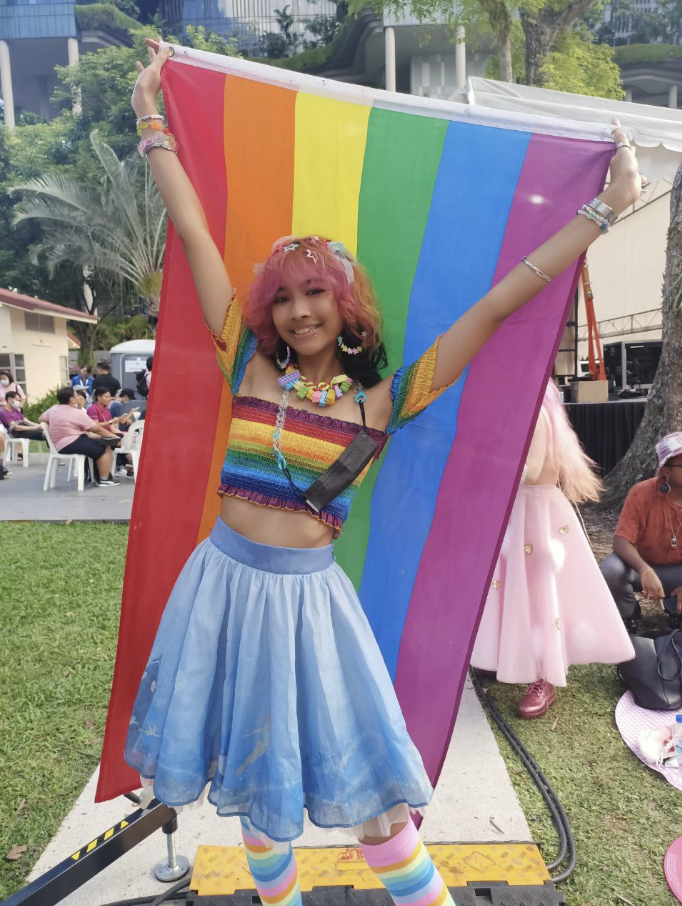
Changu received a lot of attention at this year’s Pink Dot event with their rainbow outfit and bright personality. Photo by Chin Ngiok Shuan.
The troubles with stereotyping and the social stigmas that Taylor, Leah and Changu have faced, are common ones in the community.
With Singapore being a largely conservative nation, it comes as no surprise that the queer community’s fight for equality would be a long, taxing one. Viral instances such as a transgender student in Singapore being denied hormonal therapy by the Ministry of Education even after being diagnosed with gender dysphoria and more recently, the hotel PARKROYAL COLLECTION Pickering’s refusal to host a lesbian wedding, are still all too frequent in Singapore.
However, as time goes by, it’s heartwarming to see that there is a growing trend of people in Singapore supporting same-sex relationships and declining support for Section 377A.
In Ipsos’ newest survey regarding the LGBTQ+ community in Singapore, more respondents have indicated an increased acceptance towards same-sex relationships than three years before, with 29 per cent of respondents aged 50 and above saying that they are more accepting of these relationships compared to the past. Furthermore, the latest survey found that 20 per cent of respondents opposed Section 377A of the Penal Code, an increase from the mere 12 per cent of respondents in 2018.
“A personal story of mine is my mother. She [used to oppose] the LGBTQ+ movement and is religious. But recently for some reason, she went to a local drag show and that alone opened up her eyes to the prejudice we face and also how hilarious we can be. After all, we’re still people, just with a little more pizazz,” says Changu.
Although everyone might be facing their own struggles, the fact that they are willing to come together and celebrate their differences with each other regardless of their gender, identity and sexuality, is what makes Pink Dot such a wildly successful and welcoming event for everyone. Video by Chin Ngiok Shuan.
To some local LGTBQ+ members, openly queer Singaporeans are one of the reasons why they are starting to feel more comfortable coming out to the people around them as well.
Leah says that “[openly queer Singaporeans] are helping to improve the public’s impression of the LGBTQ+ community by showing a more diverse representation”.
From W!LD RICE’s founding artistic director Ivan Heng, to local entertainer Kumar, whose works include representation of the queer community, these people have helped change how some locals view the LGBTQ+ community for the better.
“We’re just normal people. There’s no difference between the way we love our friends, our parents and our partners,” says Changu.
In his open speech to Pink Dot attendees this year, Mr Remy Choo Zheng Xi, a prominent lawyer in Singapore who is openly gay and a keynote speaker for this year’s event, says that in order for queer love and queer relationships to be accepted in Singapore, “we need to fight discrimination in our schools. We need to fight discrimination against queer people in housing policy. We need to fight for media representation. And even in our own communities, we need to fight discrimination against racial minorities. And we need to fight the stigma of those amongst us who live with HIV.”
In fighting for the marginalised in Singapore, the LGBTQ+ community puts themselves on higher ground, taking the long, winding path to equality for everyone.
“If 377A is repealed, it’s the beginning of a long road to equality, not the end.” says Mr Choo.
If 377A is repealed, it’s the beginning of a long road to equality, not the end.
While there is still a fair bit of work that needs to be done before equality can be properly achieved for the LGBTQ+ community in Singapore, some believe that a time of change is coming.
“I think everyone should be allowed to love who they want to love. The LGBTQ+ community is such a small percentage of citizens in Singapore. I just think every one should have the rights to have a home, be it gay, straight or [bisexual],” says Changu.
“All we ask for is to be treated the same.”
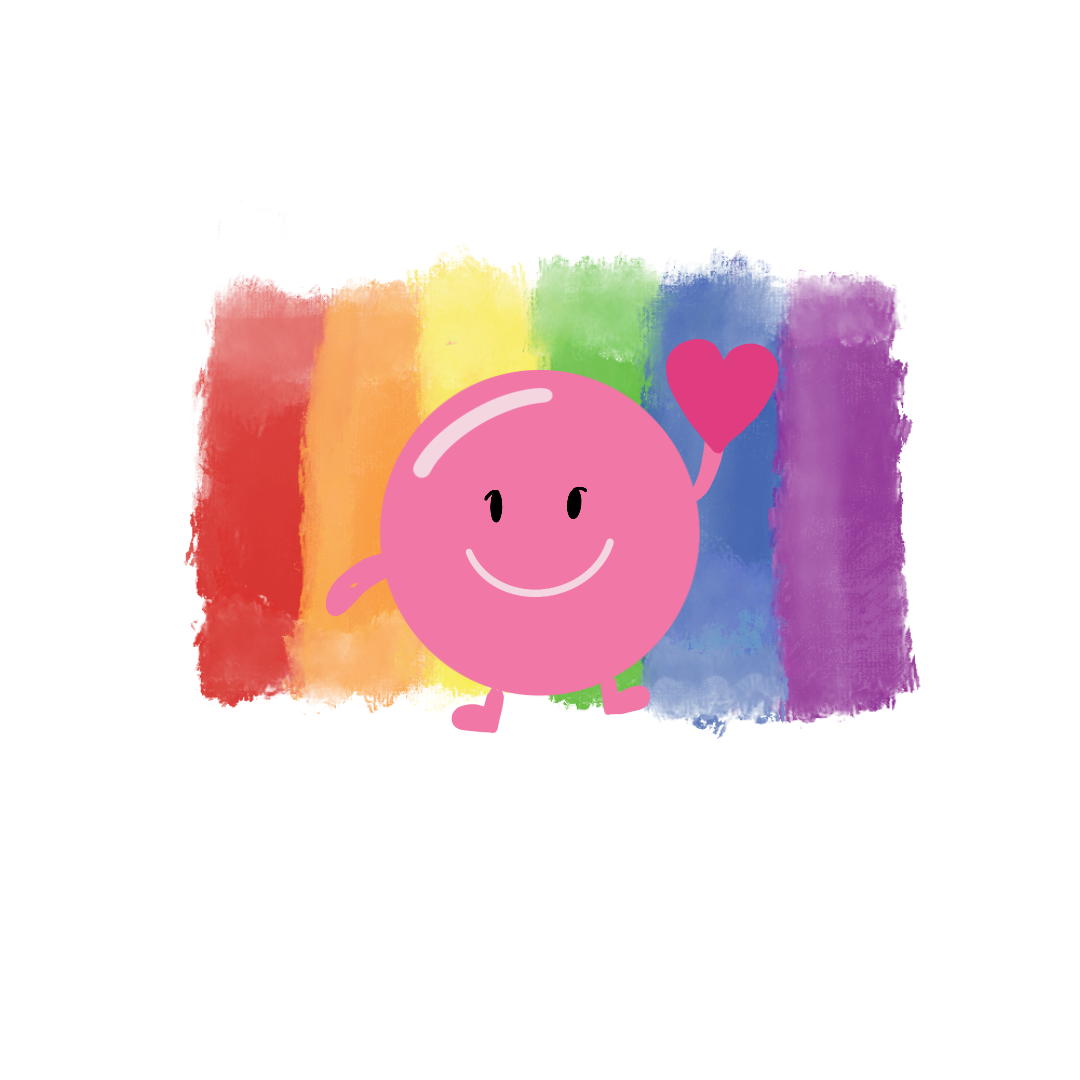
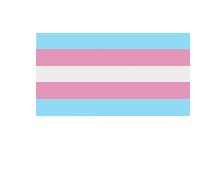

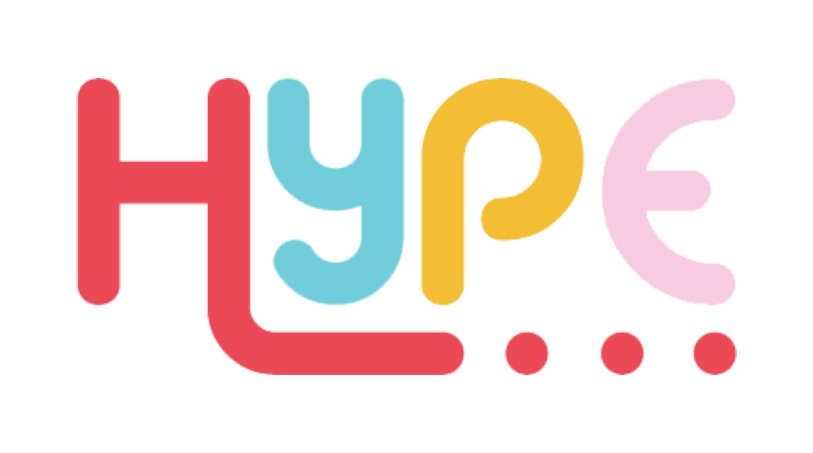
I may need your help. I’ve been doing research on gate io recently, and I’ve tried a lot of different things. Later, I read your article, and I think your way of writing has given me some innovative ideas, thank you very much.
peaceful space
harp relaxing music
deep sleep
Your article helped me a lot, is there any more related content? Thanks!
I don’t think the title of your article matches the content lol. Just kidding, mainly because I had some doubts after reading the article.
Thank you very much for sharing, I learned a lot from your article. Very cool. Thanks.
Your article helped me a lot, is there any more related content? Thanks!
I don’t think the title of your article matches the content lol. Just kidding, mainly because I had some doubts after reading the article. https://accounts.binance.com/pt-BR/register?ref=YY80CKRN
Thank you for your sharing. I am worried that I lack creative ideas. It is your article that makes me full of hope. Thank you. But, I have a question, can you help me?
Can you be more specific about the content of your article? After reading it, I still have some doubts. Hope you can help me. https://www.binance.info/vi/register-person?ref=WTOZ531Y
I don’t think the title of your article matches the content lol. Just kidding, mainly because I had some doubts after reading the article.
Your point of view caught my eye and was very interesting. Thanks. I have a question for you.
To be honest, I needed Zithromax fast and found this amazing site. You can buy antibiotics without a prescription securely. In case of a toothache, try here. Discreet packaging to USA. Visit here: safe antibiotics for purchase. Get well soon.
Lately, I was looking for antibiotics quickly and found a reliable pharmacy. You can purchase generics online securely. In case of sinusitis, this is the best place. Express delivery guaranteed. Visit here: purchase zithromax. Get well soon.
Salam dostlar, siz də keyfiyyətli kazino axtarırsınızsa, məsləhətdir ki, Pin Up saytını yoxlayasınız. Yüksək əmsallar və rahat pul çıxarışı burada mövcuddur. İndi qoşulun və ilk depozit bonusunu götürün. Daxil olmaq üçün link: Pin Up rəsmi sayt uğurlar hər kəsə!
Info slot gacor malam ini: mainkan Gate of Olympus atau Mahjong Ways di Bonaslot. Website ini anti rungkad dan resmi. Promo menarik menanti anda. Kunjungi: п»їhttps://bonaslotind.us.com/# klik disini dan menangkan.
Merhaba arkadaşlar, ödeme yapan casino siteleri bulmak istiyorsanız, bu siteye mutlaka göz atın. En iyi firmaları ve fırsatları sizin için listeledik. Dolandırılmamak için doğru adres: türkçe casino siteleri bol şanslar.
Bonaslot adalah agen judi slot online terpercaya di Indonesia. Banyak member sudah mendapatkan Maxwin sensasional disini. Proses depo WD super cepat kilat. Situs resmi п»їhttps://bonaslotind.us.com/# Bonaslot rtp jangan sampai ketinggalan.
2026 yД±lД±nda popГјler olan casino siteleri hangileri? DetaylД± liste web sitemizde mevcuttur. Bedava bahis veren siteleri ve yeni adres linklerini paylaЕџД±yoruz. Hemen tД±klayД±n п»їhttps://cassiteleri.us.org/# buraya tД±kla kazanmaya baЕџlayД±n.
Merhaba arkadaşlar, sağlam casino siteleri bulmak istiyorsanız, hazırladığımız listeye kesinlikle göz atın. Lisanslı firmaları ve fırsatları sizin için inceledik. Güvenli oyun için doğru adres: casino siteleri iyi kazançlar.
п»їHalo Slotter, lagi nyari situs slot yang mudah menang? Rekomendasi kami adalah Bonaslot. RTP Live tertinggi hari ini dan pasti bayar. Isi saldo bisa pakai Pulsa tanpa potongan. Daftar sekarang: п»їsitus slot resmi semoga maxwin.
Canlı casino oynamak isteyenler için kılavuz niteliğinde bir site: türkçe casino siteleri Hangi site güvenilir diye düşünmeyin. Editörlerimizin seçtiği bahis siteleri listesi ile rahatça oynayın. Detaylar linkte.
Bu sene en çok kazandıran casino siteleri hangileri? Detaylı liste platformumuzda mevcuttur. Deneme bonusu veren siteleri ve güncel giriş linklerini paylaşıyoruz. Hemen tıklayın kaçak bahis siteleri kazanmaya başlayın.
Bocoran slot gacor hari ini: mainkan Gate of Olympus atau Mahjong Ways di Bonaslot. Website ini gampang menang dan resmi. Bonus new member menanti anda. Akses link: п»їBonaslot daftar dan menangkan.
Yeni Pin Up giriş ünvanını axtaranlar, doğru yerdesiniz. Bloklanmayan link vasitəsilə hesabınıza girin və oynamağa başlayın. Xoş gəldin bonusu sizi gözləyir. Keçid: pinupaz.jp.net hamıya bol şans.
Aktual Pin Up giriş ünvanını axtarırsınızsa, doğru yerdesiniz. Bloklanmayan link vasitəsilə hesabınıza girin və oynamağa başlayın. Xoş gəldin bonusu sizi gözləyir. Keçid: Pinup hamıya bol şans.
п»їSalam Gacor, cari situs slot yang gacor? Coba main di Bonaslot. Winrate tertinggi hari ini dan terbukti membayar. Deposit bisa pakai Pulsa tanpa potongan. Login disini: п»їslot gacor hari ini salam jackpot.